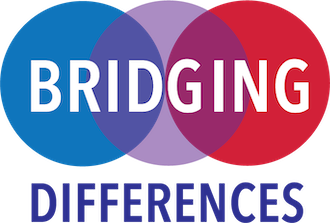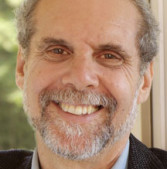Bridging Differences Defined
Our summary of the science suggesting why and how to bridge differences
The Greater Good Science Center's Bridging Differences program mixes science and storytelling to help address one of the most urgent issues of our time: political and cultural polarization.
Public discourse in our nation is at a breaking point. Recent surveys suggest that the ideological divides among Americans are greater than ever. The resulting hostility and distrust undermines our emotional well-being, the quality of our relationships, and the integrity of our democratic institutions.
Fortunately, social science research from the past several decades has been identifying whether, how, and under what circumstances people from different groups can better understand and get along with one another.

Inspired by both cutting-edge research and trailblazing practice, the Greater Good Science Center's Bridging Differences program is highlighting and disseminating the key research-based principles for fostering positive intergroup relationships. The project also calls attention to common themes, best practices, and case studies from leading programs that illuminate the research findings.
Through articles, videos (produced in partnership with NationSwell), podcast episodes, a Playbook, online course, and other resources, Bridging Differences is highlighting the skills and social conditions that are critical to reducing polarization and promoting more constructive dialogue. To ensure a multiplier effect to this work, the program aims to reach the “gatekeepers” on the front lines of efforts to bridge divides between various groups. This includes not only mediators and people leading organizations exclusively devoted to cross-group understanding but also K-12 educators, leaders in higher education, local politicians, workplace managers, and leaders of faith-based groups and other community-based organizations.
In May of 2020, we brought together top researchers, program leaders, and other experts and practitioners for a powerful one-day online event, offering evidence-based strategies for dialogue and understanding.
In October of 2021, we launched a massive open online course (MOOC) teaching key research-based strategies for bridging differences, with a particular focus on college and university campuses. Alongside that course, we are offering a Learning Fellowship for leaders in higher education who want to develop or strengthen an initiative on their campus that fosters constructive dialogue, relationships, and understanding across lines of differences. This learning community will enable them to learn from colleagues in their field at the same time that they’re gaining research-based insights from the course.
For the past two years, we have been working with leaders across sectors to help them apply our resources and strengthen their impact. Our current projects include:
Our Bridging Differences in Higher Education Learning Fellowship, which has so far supported 215 higher education leaders on college campuses nationwide who want to develop or strengthen a project to foster healthier dialogue and understanding across divides at their school. Our fellows hail from big state schools, liberal arts colleges, HBCUs, Christian colleges, and beyond (with a disproportionate number from UC Berkeley). Their fellowship centers on a deep dive into our playbook and online course as they explore how to promote bridge-building on their campus. In surveys after the fellowship, 96% of respondents said the experience “deepened [their] awareness and understanding of key research-based principles for bridging differences,” and 98% said it helped them “help other people engage in more constructive dialogue and understanding across group lines.”
Belonging Colorado, a trailblazing statewide initiative to help local communities bring people together in innovative ways across Colorado and expand Coloradans’ sense of who belongs in their state. After a competitive process, we were selected as the initiative’s implementation partner to train local community leaders and media professionals in research-based strategies to bridge differences, drawing on the playbook. In the initiative’s first phase, we are supporting 15 community organizations across the state as they develop and implement projects that bring people together across lines of race, nationality, politics, age, and more in the communities they serve. At the completion of our initial training for them, 96% of participants said it “helped [them] to understand the skills and strategies important to bridge building and fostering belonging” very or quite well, and 97% said they felt very or quite confident in their “abilities to apply bridge-building strategies in designing and implementing experiences, programs, and spaces that promote belonging.”
The Bridging Differences Leadership Cohort, an eight-month virtual learning experience that we have been running in partnership with the Council on Foundations to help philanthropy professionals understand how they can better promote bridge-building through their work. We have enrolled more than 180 participants over the past three years, representing small community foundations, major national foundations, and everything in between. Working with such an influential audience enables this project to have far-reaching ripple effects. The cohort’s curriculum centers on our Bridging Differences online course.
Other of our biggest milestones for the reach of the program so far include:
We are grateful to Allan Spivack, Einhorn Collaborative, The Arthur Vining Davis Foundations, New Pluralists funder collaborative, The Denver Foundation, and the Educating Character Initiative for their generous support of our Bridging Differences program.
Do you work to help people or groups bridge their differences? Please share your story and let us know how we can help.
Our summary of the science suggesting why and how to bridge differences
Relevant to anyone navigating conflicts and differences, particularly on college campuses
Check out our coverage of the science and practice of bridging, including articles about cutting-edge research and profiles of trailblazing programs
Our guide to the key evidence-based skills and strategies that foster positive dialogue and understanding
A series of six short videos that dynamically illustrate key skills for bridging differences
Watch videos from our one-day event featuring top researchers and program leaders
An eight-month facilitated virtual learning community, hosted by UC Berkeley’s Greater Good Science Center (GGSC).
We invite you to see how practicing these skills can foster understanding, ease stress, and create a stronger sense of connection with your loved ones and community.

“Greater Good offers a first-rate service to those who want to track new and important research findings in social and emotional intelligence.”